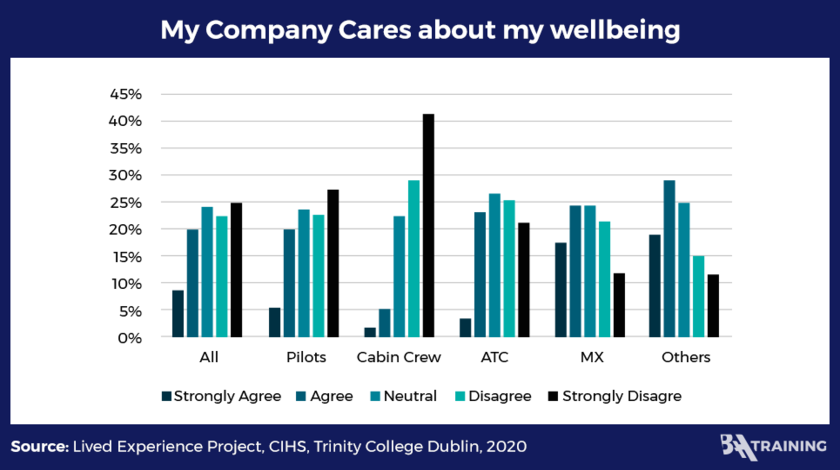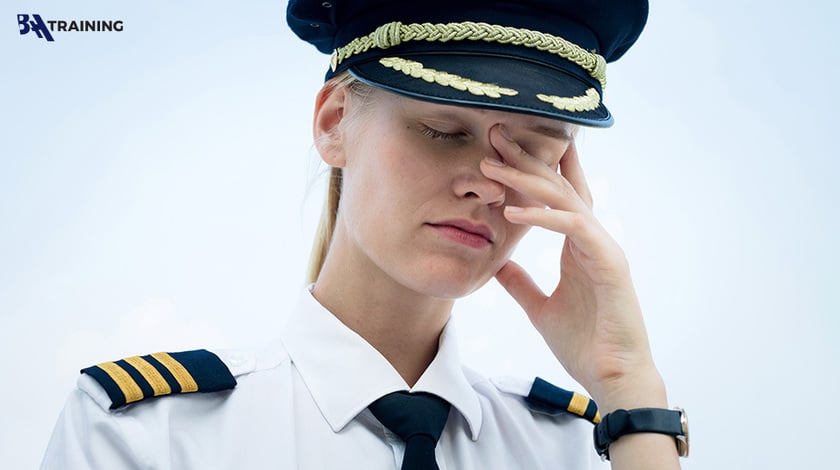Photo: BAA Training
Reading Time: 4 minutesThe Covid-19 pandemic has had an immense impact on civil aviation. Suddenly, pilots were forced to re-evaluate their job expectations and accept that nobody could no longer guarantee solid career progression. The devastating consequences of the pandemic have resulted in flight crews’ stress, depression or anxiety levels rising. What are the key stress factors imposed on pilots by the economic downturn, and is there any remedy? Let’s take a closer look at it in this article.
Self-reported mental health
In 2020, the Centre for Innovative Human Systems (CIHS), Trinity College Dublin (TCD), researched the levels of stress, depression and anxiety among employees in the civil aviation sector. The self-reported data unveiled that individuals in various positions across the industry, to a bigger or smaller extent, experience mental health issues. While the overall picture might not look overly intimidating, even small stress levels, anxiety, depression or burnout can adversely impact performance even of highly trained people. Also, self-reported data may not be one hundred percent objective as ‘absence of evidence is not evidence of absence.’

Does the company care enough?
To make matters worse, the research has revealed that only a fraction of pilots and other staff groups think their company cares about their wellbeing enough. Among pilots, over 25% of the survey participants indicated they strongly disagree with the proposition that their employer really cares.

From the above findings, it can be seen that initiatives aimed at improving pilots’ wellbeing should be in place.
Pilot Peer Support Program
Luckily, in 2018, a while earlier before the pandemic started, EASA issued a Regulation that required all commercial air transport operators to implement a Pilot Peer Support Program by 14 February 2021. The program aims to provide support for pilots facing various personal difficulties. Early identification and correct treatment through having a friendly, confidential talk help manage potential safety risks the issues could otherwise cause if not appropriately addressed.
It was perfect timing for the regulation to come into force because the pandemic has been ruthless for pilots and their mental state.
Psychological stressors amid Covid-19
There is a variety of stressors that came along with the pandemic. They range from a fear of losing a job to deteriorating personal relationships due to disturbed working patterns.
Job insecurity
If, at one point or another, redundancy or temporary furlough take a pilot by surprise, they should never forget how resourceful they are and how many transferable skills they possess. Leadership, flexibility, emotional and cultural intelligence, complex problem solving, time management, communication, multi-tasking, etc. are all giving a pilot applying for a non-flying job a competitive advantage.
Personal relationships
As paradoxical as it sounds, pilots may have found themselves unprepared for uninterrupted time together with their spouses or partners. Some have discovered that work-related separations actually maintained their relationship. Social distancing, financial struggles, home-schooling, etc., might have also left a negative imprint on the relationship. Every case is unique, and pilots must decide for themselves what will help them regain balance. For someone, it’s some personal space; for others – some mindfulness-based stress reduction exercises. Those who feel the hardship is too challenging to face alone are welcome to reach out to a Pilot Peer Support Program.
Skills are lost quickly
There are many flying errors that pilots have made because of being out of practice during the pandemic.
“Because I had not flown in a few months, I was rusty,” the First Officer who forgot to activate the anti-icing mechanism said in an anonymous report to a safety reporting system run by NASA. “I felt that my recollection was strong enough, but in reality, I should have taken some time to review” the standard operating procedures.
Aviation experts admit that when pilots are inactive for several months, their skills and proficiency worsen. For example, coming in too fast or too high during a landing or forgetting to get clearance from the air traffic control tower before descending to a lower altitude are among the most frequent mistakes. Therefore, pilots should thoroughly plan a back-to-work study regime and revise the aircraft and company procedures.
The ways to combat stress
There are, of course, many more psychological stressors than the described above that pilots have encountered during the Covid-19 times. So, the question remains – how to deal with them and continue exercising the license privileges whenever there is an opportunity? If low mood, stress, anxiety or disruptive thoughts are causing problems, the following tips might help:
- Get enough sleep
- Exercise to keep fit and healthy
- Control your diet and alcohol intake
- Stay organized and create a schedule for each day
- Maintain social contact with friends and family
- Eliminate “avoidable” stress, e.g., do not read bad news before sleep
The last and the most crucial piece of advice is to speak to a trained pilot peer if none of the above seems to be an adequate resolution to your concern. Remember – the earlier you address the problem, the less hazardous it will turn up in the end.

